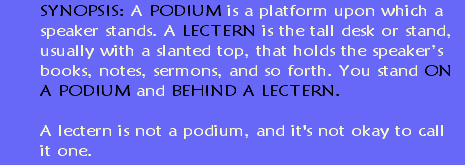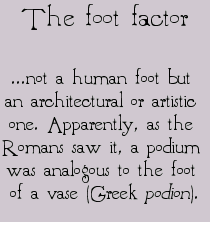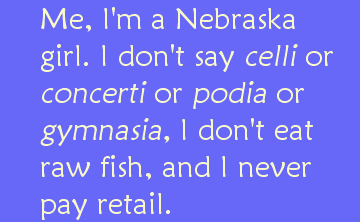| aa |
| aaa |
| Write Better Right Now (It Could Save Your Life) (under revision) by Mary Campbell |
 |

| Order or download this beautiful book of poems, prayers, meditations, songs, |
 |
 |
| Unfamiliar Territory: Prayers, Meditations, and Songs, Vol. 1, by Mary Campbell |

|
| aa |
| aa |
| aa |
| aa |


accept change as an inevitable and even beautiful quality of our language, I've become more flexible, less rigid, and more adventurous about choosing and arranging words on a page. Right. When pigs fly and hell freezes over. I hate change. If it were up to me, the Dodgers would still be in Brooklyn. Change is sometimes necessary, even beneficial. I get that. Pantyhose had to go. Lard in the cupboard, lead in the gasoline... I don't miss them. But the English language is, for the most part, nontoxic and fat-free, so let's not mess with it more than we have to. There must be a better way to write respectfully than this:
one talks like that, just as no one answers the question "Who's there?" by saying—correctly—"It is I." We can be forgiven for colloquial speech that breaks the rules... until it descends into grunts and snarls. I've been embarrassed by my own mumbles lately during the half-block stroll to the grocery store. I usually pass other pedestrians, and one of us says something on the order of
report, I used to answer...
...but lately what comes out of my mouth sounds more like this:
Speaking is work... ...a highly complex motor task that involves approximately 100 orofacial, laryngeal, pharyngeal, and respiratory muscles....(1) Human nature leans toward the "least effort principle."(2) Over time, our sloppy speech becomes formalized in the language. What's a contraction, after all, except sanctioned laziness? It's easier to say "didn't" than "did not," and even easier to say "di'n't," dropping that second pesky plosive altogether.(3) This is nothing new. The word lord, for example, comes from the Old English hlāfweard, "loaf ward," with a meaning similar to "bread-winner." (4) I learned this from Kevin Stroud on his excellent History of English Podcast (mandatory listening for English-language and British-history enthusiasts). Kevin explains how our language evolves to reflect the way we actually speak. A word's journey from its earliest appearance—quite possibly among the ancient Indo-European people long before there was an alphabet—to its current spelling, pronunciation, and usage, can be a fascinating tale. When you know a word's story, you don't like to see it misused. (1) Wikipedia (2) The principle of least effort is a broad theory that covers diverse fields from evolutionary biology to web-page design. It postulates that animals, people, even well designed machines will naturally choose the path of least resistance or "effort." —Wikipedia (3) Plosives are the kinds of sounds usually associated with the letters p, t, k; b, d, g, in which air flow from the lungs is interrupted by a complete closure being made in the mouth. —World Atlas of Language Structures Online http://wals.info/chapter/4 (4) According to the Oxford Dictionary of English, the etymology of the word can be traced back to the Old English word hlāford which originated from hlāfweard meaning "loaf- ward" or "bread keeper", reflecting the Germanic tribal custom of a chieftain providing food for his followers. —Wikipedia |
a medieval church—came into Middle English “through channels,” you might say, if you don't mind perpetrating a vicious pun that relies on a clumsy reference to the English Channel, which separates France and England. In any case, lectern came through Old French letrun, from medieval Latin lectrum, from legere “to read.”
2. We stand on a podium. If you can remember that, my work here is done. |
 |
 |

Podium is related to the Greek word pous “foot,” which in turn goes back (way back, possibly to 4000 BCE) to the Proto-Indo-European root ped- “foot." Thus, podium has something like five or six thousand years of history to its credit, as summarized below: The Life & Times of Podium
Norman French invaded England in 1066. The army—led by the Duke of Normandy (who was about to become King William I of England)—mopped the floor with weary English foot soldiers at the Battle of Hastings in 1066. In the aftermath, Normans and their families arrived in great waves, bringing their culture, their customs, and their language. Podiums not yet being in use, podium wasn't part of the initial inundation. The podium | podiums – foot | feet connection What, precisely, do podium and foot have in common? I guess I always assumed, without giving it much thought, that the podium got its name because people stand on it. You know, with their feet. But that's not it at all—though it's a useful way to remember the difference. The "foot" in this equation isn't a human foot but an architectural or artistic one, as illustrated above ("the Foot Factor"). Apparently the Romans, who invented and named the podium, thought it resembled the foot of a vase (Greek podion). If you have one podium and you get a second one, then you have two podiums. Podia is acceptable, in a pinkie-finger sort of way. If you say podia, I guarantee, people will smirk when your back is turned. Me, I'm a Nebraska girl. I don't say celli or concerti or podia or gymnasia, I don't eat raw fish, and I never pay retail. |

surely podium is that word. It's expected to do not only its own job—that is, to be the word associated with a low platform of the type shown in Fig. B (above right)—but also the job of another word, which was assigned hundreds of years ago to objects such as that shown in Fig. A (above left); and that word is lectern. Let's set the record straight right now:
consequences. If I say "Pass the salt" when I mean to say "Pass the sugar," the outcome could be... well, not disastrous but possibly unpleasant. A teaspoon of salt in a cup of coffee, first thing in the morning? Most unfortunate. But if I say "Meet me at the podium" when in fact there is no podium—only a lectern (Fig. B, above)—nobody gets hurt. Podium, lectern, whatever. Everyone knows what I mean—which might not have been the case if I'd said "Meet me at the lectern." With podium vs. lectern, miscommunication isn't usually a problem. The issue, as I see it, is etymology. |
 |
| Illustrations from "What Is a Lectern or a Podium?" Message Masters Toastmasters |
|
|
|
|
|
|
 |
|
|
The West Wing? She was spectacular, and I’m sure she didn’t mean to stomp on my heart every time she spoke of the "podium" in the White House press-briefing room, night after night, week after week, for seven agonizing years. As White House press secretary, C. J. spent a great deal of time at, behind, beside, or otherwise in the force field of the mislabeled “podium." During 155 episodes in seven seasons, certainly hundreds of people, if not thousands, had to have noticed the solecism: There's a lectern on your television screen for all the world to see, and a star of the show is calling it a podium. No doubt many viewers contacted the show. But the lectern remained a “podium” throughout the program’s run, and that means one of two things:
lectern, or (b) Lectern is yesterday's soggy Rice Krispies. It's been written out of The West Wing and drop-kicked out of our lives. If it were a lame horse it would be taken out and shot, and We the Righteous are going to have to suck it up... unless... Hey! You guys wouldn't want to join me in putting our collective foot down and making a stand for standing on (not at or behind) a podium, would you? Email mary@annagrammatica.com for a list of public officials and prominent educators to contact, starting with the Secretary-General of the United Nations. The man conducts his entire life behind a lectern. Okay, maybe it's not a global hot button, but the podium | lectern controversy isn’t just about little me with a bug in my brassiere. The experts and scholars are unanimous in their assent: A lectern isn’t a podium and it’s not okay to call it one. Here’s a heartening comment from a Toastmaster, followed by another from an authority on public speaking: A podium is a platform upon which a speaker stands while speaking. If that sounds like a stage, you are correct. It is like a stage. A podium can have a lectern on it, [as]... can a stage. You could have a lectern on a podium on a stage. A speaker stands on a podium. —Message Masters Toastmasters http://messagemasters.squarespace.com/articles/what-is-a-lectern- or-podium.html
is the slant-topped high desk that you as the speaker stand behind and use when reading your presentation notes. It can be placed in the middle of the stage or off to one side. To remember lectern, think lecture.... A podium is a raised platform on which a speaker stands during a presentation. To remember podium think podiatrist--which is a foot doctor. You will want to use a podium, especially if you are short or there are more than three rows of chairs, to ensure everyone in the back of the room can see you. http://goo.gl/lpGkNK
|
|
|
Does it really matter? No and yes. If it were only a matter of clarity, using podium instead of lectern might actually be the better choice. If you ask for a podium, you'll probably get a lectern. If you ask for a lectern, you'll probably get a blank stare. From the Daily Chronicle story cited above...
Mose asked a hotel staff member for a lectern, describing its intended use: to hold notes for the presentation. “You mean a podium?” the young man asked. “No, a lectern,” Mose insisted, though he should have known better. The man came back a few minutes later with a lectern, which he continued to refer to as a “podium." I won't give up, but I’m not optimistic. When the White House falls, can the entire free world be far behind? Maybe I'll reach out to the Lectern people, see if they're interested in a combination fundraiser | podium/lectern-awareness event: Pennies for Podiums... in the U. K., maybe Pounds for Podiums and, um, Lbs. for Lecterns? Meanwhile, if you're looking for me, I shouldn't be hard to spot; I'll be (sigh) the Last Man Standing. Mary Campbell July 23, 2016 |
Artful doesn't mean artistic. Historically, artful alludes to clever and calculating qualities such as those perfected by the Artful Dodger in Dickens's Oliver Twist.
Artful Dodger, is... [called [as a pickpocket]. —Wikipedia Importantly, often misused to introduce a statement the speaker considers important (as in Importantly, Hillary Clinton is experienced in statesmanship), actually has a negative cast. It means "in a pompous, self- important manner": The mayor strode importantly across the stage to the lectern. Actionable, new shorthand to describe something you can quickly and easily put into action, has a much older and stronger connotation of illegality. If it's actionable—like, for example, medical malpractice—you can be sued for it. Chauvinism originally referred to extreme patriotism, over-the-top allegiance to one's country. Male chauvinism thus means over-the- top allegiance to the male gender... sexism, in other words. To call a man a "chauvinist" is to criticize his nationalistic fervor. If you want to criticize his sexist attitudes, call him a "male chauvinist," or maybe just a jerk. |

|
 |
 |
|

Twist, watercolor by 'Kyd' (Joseph Clayton Clarke), c. 1890 |
| aa |
| aa |
 |

lectern for a podium”
|





